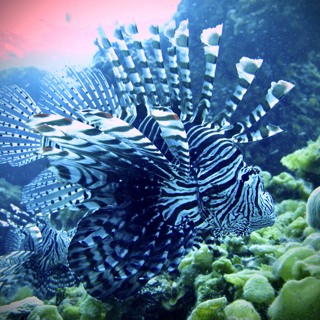
Using functional traits to identify conservation priorities for the world's crocodylians
In this podcast for Functional Ecology, Assistant Editor, Frank Harris, sits down with Phoebe Griffith—a researcher from the Institute of Zoology, London, and the Wildlife Conservation Research Unit, Oxford University—to discuss her recently published paper ‘Using functional traits to identify conservation priorities for the world's crocodylians.’ To understand better the functional diversity of crocodylians, Griffiths et al. collected a database of functional traits of all species of crocodylians. These traits are measurable qualities – such as skull shape or saltwater tolerance – that allow us to understand the different ecological role of species, and how similar and different species are from one another. Read the paper here: https://besjournals.onlinelibrary.wiley.com/doi/full/10.1111/1365-2435.14140 For those that are hard of hearing, a transcript of the interview is available here: https://fesummaries.wordpress.com/2022/08/05/conserving-the-ecological-diversity-of-crocodylians/ Check out Phoebe's Edge of Existence blogpost for some great pictures and content: https://www.edgeofexistence.org/blog/crying-crocodile-tears-the-disappearing-diversity-of-crocodilians-and-their-ecological-roles/ To find out about and support ongoing croc conservation efforts, please do check out the following links: 1. https://www.edgeofexistence.org/fellow/jailabdeen-a/ 2. https://www.edgeofexistence.org/fellow/emmanuel-amoah/ Crocodylians have surprisingly diverse ecological roles, from the huge, highly aquatic and mostly fish-eating gharial to the tiny African dwarf crocodiles which can catch prey on land below the rainforest canopy. Sadly, over half of all crocodylians are threatened with extinction. If these threatened species go extinct, we will lose the diversity of ecological roles that they represent. Functional diversity is an important aspect of biodiversity to understand and conserve.
31 Aug 202240min

MEEin3 Pilot: Preserving benthic arthropods for DNA metabarcoding
Listen to MEEin3 to hear the latest methods in ecology and evolution in just three minutes...more or less! In this episode, find out about Dr Chloe Robinson's method 'Propylene glycol-based antifreeze is an effective preservative for DNA metabarcoding of benthic arthropods' https://www.journals.uchicago.edu/doi/full/10.1086/712232
23 Aug 20224min

Tree species that live slow, die older enhance tropical peat swamp restoration
Associate Editor Sharif Mukul and Stuart W. Smith discuss this month's Editor’s Choice paper.
4 Aug 202213min

Simulated winter warming negatively impacts survival of Antarctica’s only endemic insect
In this podcast for Functional Ecology, Assistant Editor, Frank Harris, sits down with Jack J. Devlin—an early career researcher from the University of Kentucky—to discuss his recently published paper ‘Simulated winter warming negatively impacts survival of Antarctica's only endemic insect.’ Read the paper here: https://besjournals.onlinelibrary.wiley.com/doi/10.1111/1365-2435.14089 Read a transcript of this interview here: https://functionalecologists.com/2022/07/12/simulated-winter-warming-negatively-impacts-survival-of-antarcticas-only-endemic-insect-podcast-transcript/ A plain language summary of this study is available here: https://fesummaries.wordpress.com/2022/05/20/simulated-winter-warming-negatively-impacts-survival-of-antarcticas-only-endemic-insect/ Antarctic winters are challenging for terrestrial invertebrates, and species that live there have specialised adaptations to conserve energy and protect against cold injury in the winter. However, rapidly occurring climate change in these regions will increase the unpredictability of winter conditions, and there is currently a dearth of knowledge on how the highly adapted invertebrates of Antarctica will respond to changes in winter temperatures. With warmer winters expected to become more common with climate change, this study’s results indicate that winter warming could negatively impact cold-adapted insects like the Antarctic midge (Belgica antarctica). At the time of writing, this research is “in the top 5% of all research outputs ever tracked by Altmetric”.
12 Juli 202224min

Emerging relationships among microbes, soil carbon storage and climate change
In this podcast for Functional Ecology, Assistant Editor, Frank Harris, sits down with two Guest Editors—Pablo García-Palacios and Ji Chen— to discuss our recently published Special Feature on soil carbon storage. Read the Special Feature for free here: https://besjournals.onlinelibrary.wiley.com/toc/13652435/2022/36/6 A transcript of this podcast is available to read here: https://functionalecologists.com/2022/06/30/emerging-relationships-among-microbes-soil-carbon-storage-and-climate-change-podcast-transcript/ The Guest Editors' Functional Ecology blogpost can be read here: https://functionalecologists.com/2022/06/07/pablo-garcia-palacios-ji-chen-emerging-relationships-among-soil-microbes-carbon-dynamics-and-climate-change/ The Special Feature identifies emerging findings from soil microbial ecology and climate change research that can reduce uncertainty if incorporated into theory and models. The contributions span from novel perspectives on the priming effect and soil microbial enzymes, to understudied key biomes for global soil C such as tropical forests, to plant inputs–microbial necromass–mineral interactions, to soil C and microbial responses to changing precipitation patterns and recent advances in trait-based and soil C modelling. Together, this collection of papers draws attention to novel frameworks and ideas that can pave the road for future research on microbial contribution to soil C turnover and storage under climate change.
30 Juni 202222min

Understanding climate change response in the age of genomics
Blog Associate Editor, Julie Koch Sheard, sits down with the Guest Editors of Journal of Animal Ecology's Special Feature, Understanding climate change response in the age of genomics. As global temperatures continue to rise, there is a major threat to species and ecosystems worldwide. In order to develop conservation and mitigation strategies, and understanding of how animal populations respond to changing environments is crucial. Recent genomics-based studies have begun to shed light on the mechanisms by which animal populations respond to climate change and offer methods to predict how they will respond in the future. This Special Feature highlights emerging genomics approaches and their applications across a diverse range of animal species; exploring range shifts, phenotypic plasticity and local adaptation of animal populations. By connecting these topics and their ecological implications, this feature aids researchers in using genomics to understanding climate change response.
7 Juni 20221h 2min

JEC JOURNAL CLUB: Extinction, climate change and the ecology of Homo sapiens
JOURNAL CLUB: Jane Catford interviews Prof. David Tilman about his mini-review: Extinction, climate change and the ecology of Homo sapiens. Listen to the podcast, and then join Dave online for a live Twitter discussion! (full details below) • 00:00 Introductions and a summary of the paper. • 03:12 What’s led you from the start of your career, to asking these big questions around the impacts of agriculture, fossil fuels, and the intersection of human health and the environment? • 06:25 You say in your abstract that ‘ecology needs to become a more mechanistic and predictive science’ - how can we achieve that, and what do you think has been holding us back? • 08:42 If we had more mechanistic predictive models, do you think we could have better anticipated those unintended consequences that came out from mandating that we use maize for fuel? • 12:13 You make a strong argument that we need to be doing more multi-disciplinary thinking and working - in practice, how do we do that? • 19:10 Which strategies should be used to best communicate our science to policy makers and decision makers? • 21:24 The messages from your paper are very sobering, how do you deal with this and stay optimistic as you look to the future? • 24:40 Live Twitter discussion details Read the full paper here: https://besjournals.onlinelibrary.wiley.com/doi/epdf/10.1111/1365-2745.13847 If you’d like to chat to Dave about his research, join us for a JOURNAL CLUB discussion, LIVE on Twitter, and tag us in your questions and comments: 🗓️DATE: Tuesday 24th May 2022, 3pm (UK time) 📌TWITTER TAGS: #JEcolJournalClub @GDavidTilman Or, leave your questions in the comments below, by the above date.
3 Maj 202225min

FE: Lara Ferry talks to Lillian Tuttle about differential learning by native vs invasive predators
Lara Ferry talks to Lillian Tuttle, an early career researcher shortlisted for the 2021 Haldane Prize, about how a small-yet-mighty fish, the cleaner goby, may be relatively immune to lionfish predation for an unexpected reason. Read the research here: https://besjournals.onlinelibrary.wiley.com/doi/10.1111/1365-2435.13806
28 Apr 202211min





















